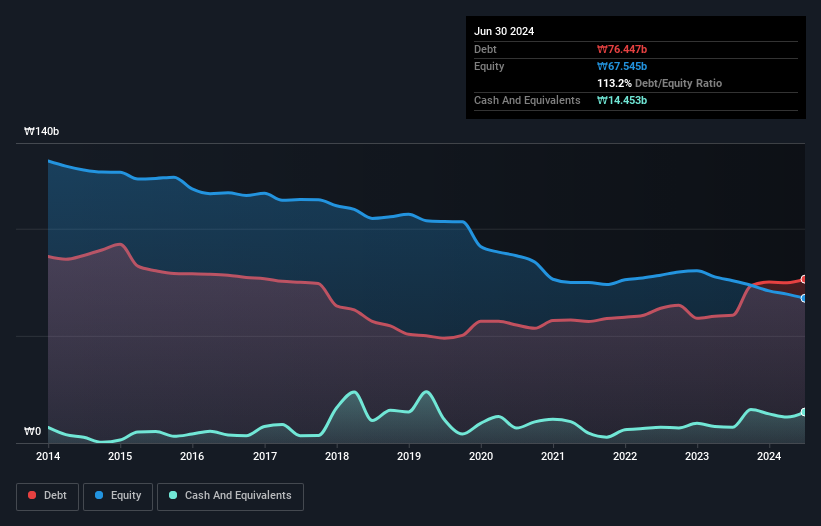Does Daelim Trading (KRX:006570) Have A Healthy Balance Sheet?
Howard Marks put it nicely when he said that, rather than worrying about share price volatility, 'The possibility of permanent loss is the risk I worry about... and every practical investor I know worries about.' It's only natural to consider a company's balance sheet when you examine how risky it is, since debt is often involved when a business collapses. Importantly, Daelim Trading Co., Ltd. (KRX:006570) does carry debt. But the real question is whether this debt is making the company risky.
What Risk Does Debt Bring?
Generally speaking, debt only becomes a real problem when a company can't easily pay it off, either by raising capital or with its own cash flow. If things get really bad, the lenders can take control of the business. While that is not too common, we often do see indebted companies permanently diluting shareholders because lenders force them to raise capital at a distressed price. Having said that, the most common situation is where a company manages its debt reasonably well - and to its own advantage. When we think about a company's use of debt, we first look at cash and debt together.
Check out our latest analysis for Daelim Trading
What Is Daelim Trading's Debt?
As you can see below, at the end of June 2024, Daelim Trading had ₩76.4b of debt, up from ₩59.6b a year ago. Click the image for more detail. However, it also had ₩14.5b in cash, and so its net debt is ₩62.0b.

A Look At Daelim Trading's Liabilities
The latest balance sheet data shows that Daelim Trading had liabilities of ₩96.0b due within a year, and liabilities of ₩14.6b falling due after that. Offsetting these obligations, it had cash of ₩14.5b as well as receivables valued at ₩27.8b due within 12 months. So its liabilities outweigh the sum of its cash and (near-term) receivables by ₩68.3b.
This deficit casts a shadow over the ₩38.6b company, like a colossus towering over mere mortals. So we definitely think shareholders need to watch this one closely. After all, Daelim Trading would likely require a major re-capitalisation if it had to pay its creditors today. There's no doubt that we learn most about debt from the balance sheet. But you can't view debt in total isolation; since Daelim Trading will need earnings to service that debt. So if you're keen to discover more about its earnings, it might be worth checking out this graph of its long term earnings trend.
Over 12 months, Daelim Trading made a loss at the EBIT level, and saw its revenue drop to ₩143b, which is a fall of 13%. That's not what we would hope to see.
Caveat Emptor
While Daelim Trading's falling revenue is about as heartwarming as a wet blanket, arguably its earnings before interest and tax (EBIT) loss is even less appealing. Indeed, it lost a very considerable ₩3.9b at the EBIT level. Considering that alongside the liabilities mentioned above make us nervous about the company. It would need to improve its operations quickly for us to be interested in it. Not least because it had negative free cash flow of ₩7.4b over the last twelve months. So suffice it to say we consider the stock to be risky. The balance sheet is clearly the area to focus on when you are analysing debt. However, not all investment risk resides within the balance sheet - far from it. To that end, you should be aware of the 1 warning sign we've spotted with Daelim Trading .
Of course, if you're the type of investor who prefers buying stocks without the burden of debt, then don't hesitate to discover our exclusive list of net cash growth stocks, today.
Have feedback on this article? Concerned about the content? Get in touch with us directly. Alternatively, email editorial-team (at) simplywallst.com.
This article by Simply Wall St is general in nature. We provide commentary based on historical data and analyst forecasts only using an unbiased methodology and our articles are not intended to be financial advice. It does not constitute a recommendation to buy or sell any stock, and does not take account of your objectives, or your financial situation. We aim to bring you long-term focused analysis driven by fundamental data. Note that our analysis may not factor in the latest price-sensitive company announcements or qualitative material. Simply Wall St has no position in any stocks mentioned.
 Index Options
Index Options CME Group
CME Group Nasdaq
Nasdaq Cboe
Cboe TradingView
TradingView Wall Street Journal
Wall Street Journal